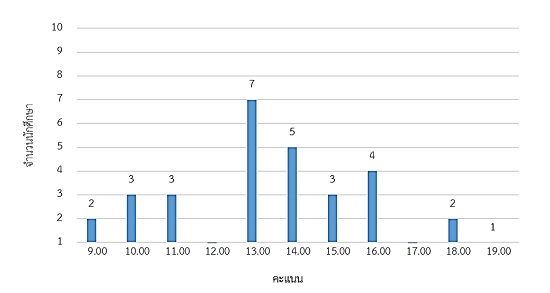SCIENTIFIC REASONING ABILITY OF STUDENT TEACHERS IN GENERAL SCIENCE PROGRAM
DOI:
https://doi.org/10.14456/nrru-rdi.2022.72Keywords:
Scientific reasoning, Student teachers in general science, Deductive reasoning, Inductive reasoningAbstract
Scientific reasoning is an essential skill for transforming students into scientific literate. In addition, scientific reasoning is a part of the professional competence of science teachers. This research aims to explore the scientific reasoning abilities of 30 2nd general science students using simple random sampling. Data were collected using a 24-item scientific reasoning scale using related biologically daily life situations and measuring two components, deductive reasoning, and inductive reasoning, that the consistency index was 0.67-1.00. The data was analyzed by means and content analysis. The results showed that the mean scores in all sub-components were low. Inductive reasoning on inductive proof identification was the highest mean score (=0.73, S.D.=0.44 out of 2 points), followed by inductive reasoning on inductive conclusions (x̄=0.61, S.D.=0.55 out of 2 points), and deductive reasoning in deductive reasoning (
=0.59, S.D.=0.54 out of 2 points), respectively. The lowest mean score was the inductive reason on inductive reasoning (
=0.40, S.D.=0.56 out of 2 points), and flowing by deductive reasoning on deductive reasoning (
=0.49, S.D.=0.50 out of 2 points). The content analysis indicated that they incompletely provided reasons to support their claims. The results of this research reflect that the science teacher curriculum should promote more student teachers’ scientific reasoning, primarily in the inductive and deductive hypotheses field
References
Ahmad, M., Shah, M. A. U. H., & Raheem, M. A. (2020). Scientific reasoning ability and academic achievement of secondary school students. Global Regional Review, 1, 356-363. http://dx.doi.org/10.31703/grr.2020 (V-I).39
BBC News Thailand. (2020). Faster ocean currents may result in climate change. Retrieved 15 May 2021, from https://www.bbc.com/thai (In Thai)
BBC News Thailand. (2021). Water bear "Tardigrade" resistant to taunts survived even in bullets fired from High-speed gunfire. Retrieved May 21, 2021, from https://www.bbc.com/thai/international-57199493 (In Thai)
Cronbach, L. J. (1990). Essentials of psychological testing (5th ed.). New York : Harper Collins.
European Commission. (2015). Science education for responsible citizenship. Brussels: European Commission. Retrieved 15 May 2021, from http://ec.europa.eu/research/swafs/pdf/pub_science_educatio/KI-NA-26-893-EN-N.pdf
Habaci, I, Karatas, E., Adıgüzelli, F., Ürker, A., & Atıici, R. (2013). Current problems of teachers. Turkish Studies, 8(6), 264.
Kanjanawasri, S. (2001). Choosing the right statistics for research (4th ed.). Bangkok : Boonsiri Kampim. (In Thai)
Katajit, P. (2017). True or fictional? Stress causes gray hair to grow faster. Retrieved April 15, 2021, from https://www.scimath.org/article-biology/item/7423-2017-08-08-07-56-36 (In Thai)
Katajit, P. (2017). Why does a person's height decrease with age?. Retrieved April 15, 2021, from https://www.scimath.org/article-biology/item/11482-2020-04-21-07-38-30 (In Thai)
Khampiuta, C., Bongkotphet, T., & Nangngang, P. (2018). Developing the ability to justify oriented Science using the controversial teaching model of digestive system for 4th grade students. Journal of Teaching and Learning Development, Rangsit University, 12(1), 56-71. (In Thai)
Koul, L. (1984). Methodology of Educational Research. New Delhi : Vani Education Book.
Krell, M., Dawborn-Gundlach, M., & van Driel, J. (2020). Scientific reasoning competencies in science teaching. Teaching Science, 66(2), 32-42.
Krell, M., Redman, C., Mathesius, S., Krüger, D., & van Driel, J. (2020). Assessing pre-service science teachers’ scientific reasoning competencies. Research in Science Education, 50(6), 2305-2329.
Krell, M., Khan, S., Vergara, C., Cofré, H., Mathesius, S., & Krüger, D. (2022). Pre-Service Science Teachers’ Scientific Reasoning Competencies: Analyzing the Impact of Contributing Factors. Research in Science Education. https://doi.org/10.1007/s11165-022-10045-x
Lawson, A. E. (1978). The development and validation of a classroom test of formal reasoning. Journal of Research in Science Teaching, 15(1), 11-24.
Lawson, A. E. (2009). Basic inferences of scientific reasoning, argumentation, and discovery. Science Education, 94(2), 356-362.
Lawson, A. E., Clark, B., Cramer-Meldrum, E., Falconer, K. A., Sequist, J. M., & Kwon, Y. J. (2000). Development of scientific reasoning in college biology: Do two levels of general hypothesis-testing skills exist?. Journal of Research in Science Teaching: The Official Journal of the National Association for Research in Science Teaching, 37(1), 81-101.
National Research Council. (2001). Educating Teachers of Science, Mathematics, and Technology. Washington, DC : National Academies Press.
Niamthong, N. (2018). Is it true to say that MSG is forbidden to hemorrhages?. Retrieved April 15, 2021, from https://www.scimath.org/article-biology/item/8505-2018-07-18-04-51-29 (In Thai)
Nuangchalerm, P. (2015). Objectives of the 21st Century Teaching and Learning in Science. Journal of Education, MahaSarakham University, 9(4), 7-14. (In Thai)
Overholser, J. C. (1993). Elements of the Socratic Method: II. Inductive reasoning. Psychotherapy: Theory, Research, Practice, Training, 30(1), 75-85. https://doi.org/10.1037/0033-3204.30.1.75
Putri, N. D., Handayanto, S. K., Hidayat, A., & Saniso, E. (2020). Students’ scientific reasoning skills in a fluid and its correlation with project activity. Journal of Physics: Conference Series, 1567(3), 032-083. IOP Publishing. doi:10.1088/1742-6596/1567/3/032083
Rovinelli, R. J., & Hambleton, R. K. (1977). On the use of content specialists in the assessment of criterion-referenced test item validity. Tijdschrift voor Onderwijs research, 2, 49-60.
Senasingh, V. (2020). Aerated compost. Retrieved April 15, 2021, from https://www.scimath.org/article-Biology/item/10990-2019-10-25-07-40-50 (In Thai)
Sinhaburajarn, S. (2021). What does the plague have to do with global warming?. Retrieved April 17, 2021, from https://www.scimath.org/article-biology/item/11659-2020-06-30-06-16-15 (In Thai)
Soncha, N. (2018). The Development of Grade tenth Students’ Scientific Reasoning Ability Though Argument-Driven Inquiry. Thesis, Master of Education Program in Science Education, Kasetsart University, Bangkok. (In Thai)
Soncha, N., Kongsema, M., & Kassingh, J. (2021). Enhancing Grade 10 Students’ Scientific Reasoning in Biology Course through Argument-Driven Inquiry. Journal of Rangsit University: Teaching & Learning, 15(2), 140-153. (In Thai)
Sternberg, R. J. (2009). Cognitive Psychology. Belmont, CA : Wadsworth.

Downloads
Published
How to Cite
Issue
Section
License

This work is licensed under a Creative Commons Attribution-NonCommercial-NoDerivatives 4.0 International License.




